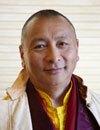
The most common analogy for buddha nature is that it is like the innate potential a seed has to grow into or produce its particular fruit. In the same way as a particular seed has the innate or natural ability under the right circumstances to become or produce its particular fruit, each and every being has the innate ability, according to the Buddha, to become a buddha.
In more detail it’s actually more than a seed, because a seed has to grow into or turn into its fruit. The relationship between ourselves as sentient beings and buddhahood is much closer than that because we are already buddhas. But at the same time, we are temporarily – it’s a very long temporarily, but temporarily — ignorant of who and what we are. Because we are ignorant, we substitute an awareness of reality with delusion. But nevertheless, no matter how deluded we may have become, fundamentally we remain potential buddhas. Whereas a seed has to grow into a tree, we merely have to discard the delusion that keeps us from manifesting our own potential for awakening.
What in the Buddhist tradition is seen as a process of internal discovery — the discovery of the buddha within through this process of awakening — is in other traditions described as something that is freely given by an outside entity. In which case more often than “liberation” the term “salvation” or “grace” is used. And each tradition uses this apparently disparate and contradictory model because it is determined that this model, this terminology, is the best way to communicate the message to the followers of that particular tradition.
In the Buddhist tradition we take a great deal of responsibility on ourselves. We consider our suffering to be the result of our own previous actions or karmas and we consider our delusion to be a result of our own ignorance. Therefore we seek to discard that delusion, purify that karma, and discover the buddha within.
[From a talk titled Dharma Without Borders given by Bardor Tulku Rinpoche at Kunzang Choling Phoenix in January 2015. Translated by Lama Yeshe Gyamtso.]
